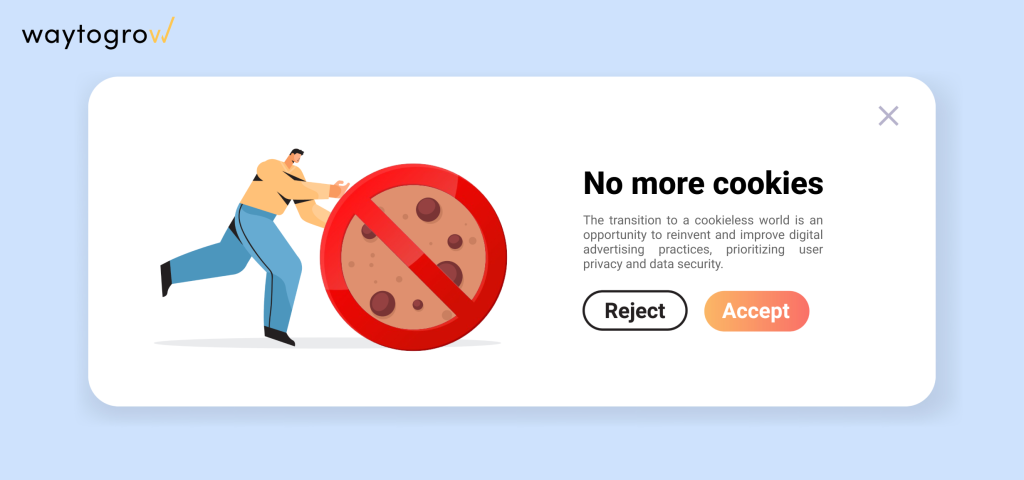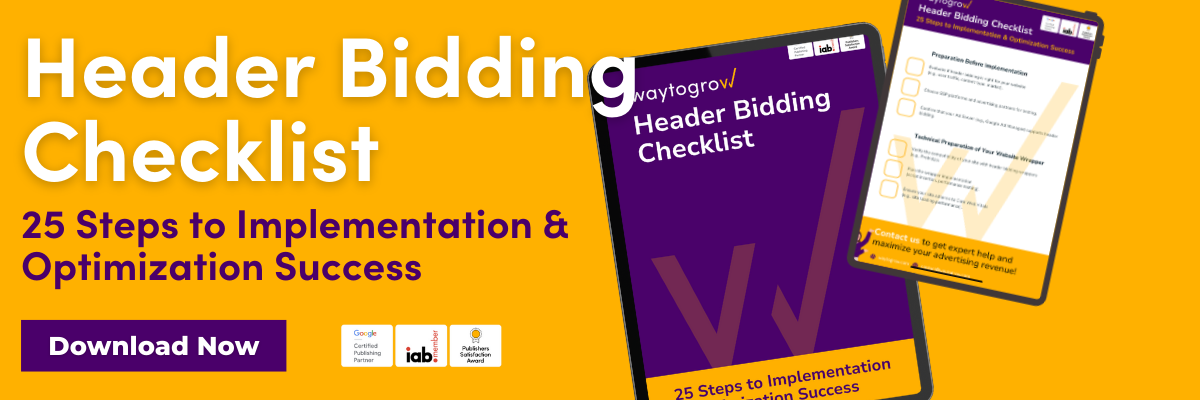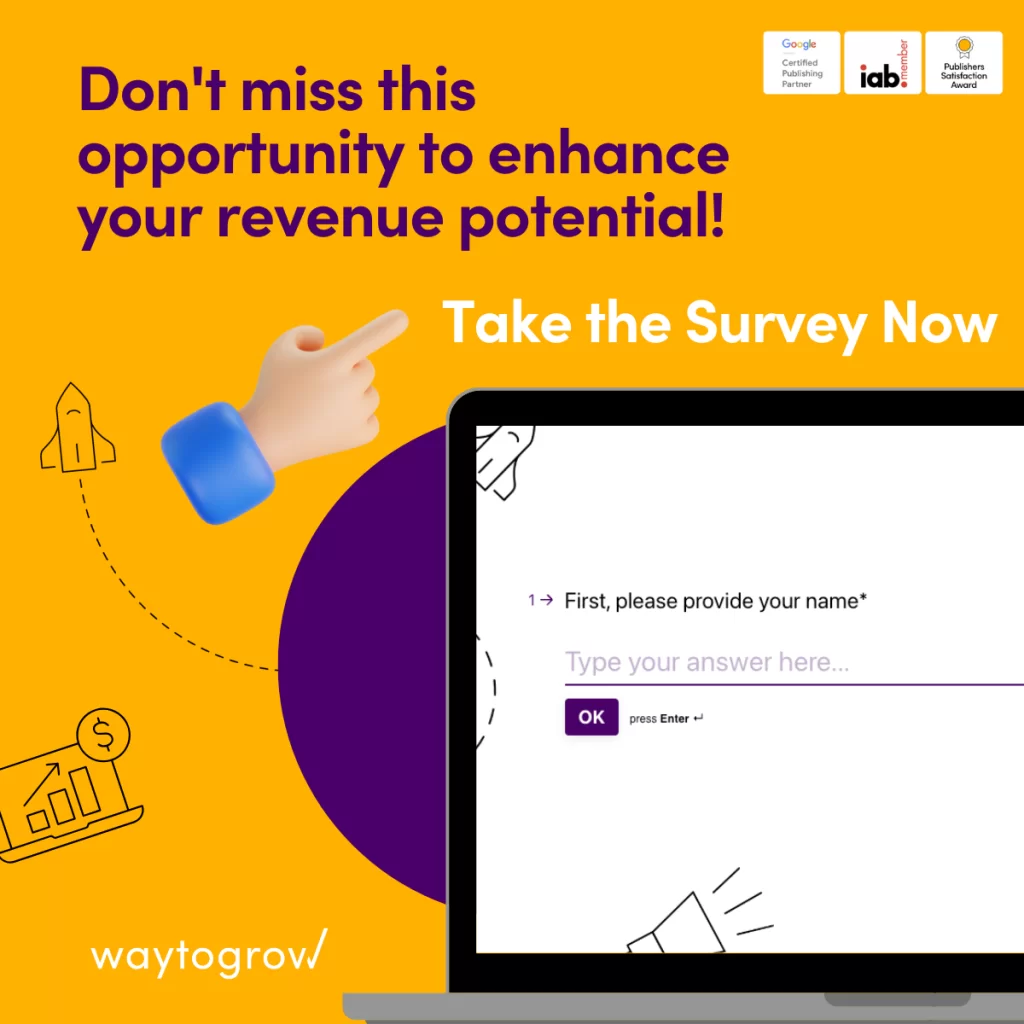- Introduction to Website Monetization
- 1. The Cookieless Future: Navigating the Post-Cookie Landscape for Publishers
- 2. Privacy-Focused Advertising: Navigating the New Norm
- 3. Artificial Intelligence and Machine Learning to Monetize Your Website
- 4. Mobile-First Strategies in Website Monetization
- 5. E-Commerce Integration: Blending Retail with Content and Affiliate Marketing
- 6. Interactive and Immersive Ads: Elevating Engagement and Monetization
- 7. User Experience (UX) Optimization: Enhancing Engagement and Revenue
- 8. Diversified Revenue Streams: Expanding Monetization Opportunities to Generate Income
- 9. Video Content Monetization: Harnessing the Power of Visual Media
- 10. Programmatic Advertising: The New Era of Ad Buying and Selling
- 11. Supply Path Optimization (SPO): Streamlining for Efficiency and Profit
- 12. Affiliate Marketing: Building Partnerships for Profit
- Conclusion: Embracing Website Monetization Trends with Waytogrow
In the ever-evolving world of digital advertising, staying ahead of the curve is essential for maximizing website revenue. As we look towards 2024, several key trends are shaping the future of website monetization. From leveraging cutting-edge technology to adapting to changing user behaviors, these trends offer a roadmap for publishers looking to enhance their revenue streams. This article delves into the top 12 trends in website monetization to follow, highlighting how tools and products from Waytogrow can help you capitalize on these trends and understand how to monetize your website effectively.

Introduction to Website Monetization
What is Website Monetization?
Website monetization refers to the process of generating income from your website. This can be achieved through various methods, such as displaying ads, selling products or services, and leveraging affiliate marketing. Essentially, any strategy that turns your website traffic into revenue falls under the umbrella of website monetization. By understanding and implementing these strategies, you can transform your website from a simple online presence into a profitable venture.
Why Monetize Your Website?
Monetizing your website offers numerous benefits. Firstly, it provides a steady stream of passive income, allowing you to earn money even when you’re not actively working on your site. This income can be reinvested into your website to improve content quality, enhance user experience, and drive more traffic. Additionally, monetization can help you fund your passion projects, turning your hobbies or interests into a sustainable business. By monetizing your website, you can also build stronger relationships with your audience, offering them valuable content and services while generating revenue.
1. The Cookieless Future: Navigating the Post-Cookie Landscape for Publishers
As we venture deeper into 2024, the digital advertising world stands on the brink of a transformative era – the cookieless future. With the impending depreciation of third-party cookies, the status quo of online advertising is set to change dramatically, posing new challenges and opportunities for publishers. This section delves into what the cookieless future entails and how publishers can bridge the gap in a post-cookie world.

Embracing the New Era of Digital Advertising
The depreciation of third-party cookies marks a significant shift in digital advertising. This change disrupts traditional methods of online tracking and ad targeting, compelling publishers and advertisers to explore innovative alternatives. The transition to a cookieless world is not just a challenge; it’s an opportunity to reinvent and improve digital advertising practices, prioritizing user privacy and data security.
Bridging the Gap Post-Cookies
In the wake of cookies disappearing, several technologies and strategies are emerging to bridge the gap. Solutions like User IDs (i.e ID5) and email hashing are gaining traction, offering alternative methods for user identification and audience targeting. These technologies ensure publishers can continue to deliver personalized ad experiences while respecting user privacy.
Additionally, First-Party Data (FPD) solutions are becoming increasingly vital. By leveraging their own data, publishers can offer targeted advertising based on direct user interactions with their site. This approach not only maintains the relevance of ads but also enhances user trust due to its transparent nature.
Google’s Privacy Sandbox: A New Direction
Google’s Privacy Sandbox initiative, particularly its Protected Audience API (PAAPI), plays a crucial role in shaping the cookieless future. PAAPI aims to provide audience addressability without compromising user privacy, offering a sustainable solution for publishers in the Chrome browser environment. It’s a promising development that balances the needs of advertisers with the privacy concerns of users.
The Impact on Publishers
For publishers, the shift to a cookieless world necessitates a strategic overhaul. They must adapt to new technologies and practices, such as enhancing their FPD capabilities and exploring partnerships with platforms offering cookieless solutions. Publishers need to stay informed and agile, ready to adopt new standards and technologies as they emerge.
Waytogrow: Guiding Publishers Through the Transition
In this new landscape, Waytogrow stands as a beacon for publishers navigating the complexities of the cookieless future. With their expertise in the latest technologies and trends, including Google’s Privacy Sandbox and FPD strategies, Waytogrow is ideally positioned to guide publishers through this transition. We offer the tools, insights, and support necessary for publishers to adapt effectively, ensuring they can continue to monetize their content and thrive in the post-cookie era.
The journey into the cookieless future is undoubtedly challenging, but it also opens doors to more ethical, transparent, and efficient digital advertising practices. With the right strategies and partners like Waytogrow, publishers can turn these challenges into opportunities, paving the way for a more sustainable and user-centric digital advertising ecosystem.
2. Privacy-Focused Advertising: Navigating the New Norm
As we venture into 2024, the landscape of website monetization is increasingly shaped by privacy-focused advertising. The trend, cemented by stringent regulations and growing data privacy concerns, mandates a shift where user consent and privacy are central.

Embracing Privacy-First Approaches
The pivot to privacy-focused advertising signifies a move away from traditional targeting methods. Advertisers are now prioritizing contextually relevant ads, driven by content themes and user interests, minimizing reliance on personal data. This strategy requires a nuanced understanding of audience segments and aligning ads with content, ensuring relevancy without compromising privacy.
The Rise of Consent Management Platforms
CMPs have become indispensable in privacy-focused advertising. These platforms facilitate effective user consent management, ensuring compliance with regulations like GDPR and CCPA. CMPs not only safeguard user privacy but also provide publishers with insights into user preferences, enhancing the delivery of tailored advertising experiences.
Google’s Updated Ad-Serving Requirements and Certified CMPs
Google’s recent update to its ad-serving requirements in the EEA and the UK necessitates the use of Google-certified CMPs, integrated with the IAB Europe’s Transparency and Consent Framework (TCF). Publishers not complying may face limitations in ad serving, significantly affecting monetization.
FTC’s Proposed Changes to the COPPA Rule
The FTC’s proposed changes to the COPPA Rule introduce stricter controls on the use and disclosure of children’s personal information. These changes are poised to reshape how children’s data is monetized, emphasizing privacy and security. The proposal aims to shift the responsibility from parents to providers, ensuring that digital services are safer for children. This includes requiring separate opt-in for targeted advertising and imposing limits on data retention and the use of personal information for commercial purposes.
Waytogrow’s Role in Privacy-Focused Monetization
In this evolving landscape, Waytogrow is dedicated to guiding publishers through these changes. Our tools and expertise are geared towards helping publishers adapt to privacy-first strategies, leveraging first-party data, and implementing certified CMPs. We ensure publishers can monetize effectively while upholding the highest privacy standards.
Thriving in the New Era of Privacy
By embracing privacy-first strategies and leveraging expertise from companies like Waytogrow, publishers, and advertisers can navigate this new era successfully, turning challenges into opportunities for sustainable growth and enhanced user trust.
3. Artificial Intelligence and Machine Learning to Monetize Your Website
As we advance into 2024, it makes sense that Artificial Intelligence (AI) and Machine Learning (ML) are not just buzzwords but critical tools driving the future of website monetization. These technologies are reshaping how publishers optimize ad placements, personalize user experiences, and maximize revenue.
The Power of AI and ML in Ad Optimization
AI and ML algorithms analyze vast amounts of data to understand user preferences and behaviors. This data-driven approach enables publishers to display the most relevant ads to each user, thereby increasing the likelihood of user engagement and click-throughs. For instance, AI can determine the best ad formats and placements based on user interaction patterns, ensuring that ads are not intrusive but rather complement the user experience.

Waytogrow’s GROW Smart Engine** exemplifies the integration of AI and ML** in ad optimization. By leveraging these technologies, the GROW Smart Engine analyzes real-time data to place ads where they are most effective, ensuring that every ad impression counts and contributes to revenue growth.
Personalization: The Key to User Engagement
In the realm of digital advertising, one size does not fit all. AI and ML enable hyper-personalization of ads, tailoring them to match the interests and preferences of individual users. This personalization extends beyond basic demographic targeting, encompassing user browsing habits, purchase history, and even the time of day. The result is a more engaging ad experience that resonates with the user, leading to higher engagement rates and, ultimately, better monetization outcomes.
Predictive Analytics for Future-Proof Strategies
Another significant advantage of AI and ML in website monetization is predictive analytics. By analyzing past trends and user behaviors, AI can forecast future patterns, allowing publishers to adapt their strategies proactively. This foresight is invaluable in a rapidly evolving digital landscape, ensuring that publishers stay ahead of the curve in monetization strategies.
Enhancing Ad Performance with Machine Learning
ML algorithms continually learn and evolve based on new data, leading to continuous improvement in ad performance. This means that over time, the accuracy of targeting and effectiveness of ad placements only get better, maximizing the potential for ad revenue.
AI Optimization from an AdOps Perspective
Utilizing AI within the optimization process dramatically increases the effectiveness and efficiency of the monetization effort. AI tools are employed to detect optimization opportunities in real time, providing suggestions and insights for further enhancements to floor pricing rules, audience targeting, and campaign management. This approach not only increases the speed of the optimization process but also allows the ad operations team to focus their time on more demanding technical tasks and the further development of a publisher’s advertising stack. By integrating AI, Waytogrow ensures that the AdOps team can harness these advanced tools to maximize ad revenue while streamlining operational efficiency.
As we move forward into 2024, the landscape of website monetization is increasingly being shaped by the powerful forces of Artificial Intelligence (AI) and Machine Learning (ML). These technologies are not just add-ons but essential elements that define the efficiency and effectiveness of digital advertising strategies.
Waytogrow, with its comprehensive suite of solutions, stands at the forefront of this technological revolution. Beyond the GROW Smart Engine, Waytogrow offers a range of innovative products designed to cater to various aspects of digital advertising and website monetization. From advanced targeting to optimized ad placements, and personalized user experiences, Waytogrow’s tools are engineered to harness the full potential of AI and ML.
The integration of AI and ML in digital advertising through Waytogrow’s suite is not just about maintaining competitiveness. It represents a paradigm shift towards setting new benchmarks in user engagement, ad performance, and monetization efficiency. Publishers leveraging these tools are equipped to navigate the evolving digital landscape proactively, ensuring that they not only meet but exceed the dynamic needs of their audience and advertisers.
In essence, as the digital world evolves, Waytogrow’s suite of solutions embodies the future of website monetization – a future where technology and human insight converge to create unparalleled value for publishers and advertisers alike.
4. Mobile-First Strategies in Website Monetization
In 2024, the mobile-first approach remains a cornerstone of website monetization strategies. With the ever-increasing use of smartphones and tablets for internet access, prioritizing mobile users is not just an option but a necessity for publishers and advertisers aiming to maximize their digital presence and revenue.

Emphasizing Mobile User Experience
The essence of a mobile-first strategy lies in designing websites and ads with mobile users as the primary audience. This involves creating responsive designs that adapt seamlessly to different screen sizes, ensuring that content and ads are easily accessible and engaging on any mobile device. Even if you have a free website, prioritizing mobile users is essential for maximizing your digital presence and revenue. The goal is to provide a fluid and intuitive user experience, minimizing load times and optimizing navigation to keep mobile users engaged.
Waytogrow’s innovative tools, such as the GROW Sticky Banner, GROW Smart Engine, GROW Video Player, are designed with a mobile-first mindset. This approach enhances user engagement, leading to higher click-through rates and, consequently, increased ad revenue from mobile traffic.
Leveraging Mobile-Specific Ad Formats
In 2024, mobile-specific ad formats continue to gain prominence. Formats like interstitial ads, rewarded video ads, and native ads are particularly effective on mobile devices due to their immersive nature. These formats provide a non-intrusive ad experience while offering high engagement potential. Advertisers and publishers must explore these mobile-centric ad formats to tap into the lucrative mobile audience effectively.
The Importance of Mobile Speed and Performance
In the mobile-first era, speed and performance stand as non-negotiable elements in crafting an exceptional user experience. Mobile users have come to expect rapid load times and seamless interactions. Any lag or delay not only tests their patience but also significantly hikes up the chances of them bouncing off the site. Hence, it’s imperative to optimize mobile sites for speed, which is a complex task involving various factors.
One key aspect is minimizing the use of heavy graphics and streamlining the site’s code. This ensures that both content and ads load swiftly, maintaining a smooth flow. In this context, all ad units managed by Waytogrow are meticulously designed to operate asynchronously on a publisher’s domain, effectively minimizing their impact on loading times and other Core Web Vitals. This approach ensures that the presence of ads doesn’t compromise the site’s performance, maintaining a balance between monetization and user experience.
Furthermore, employing features like lazy loading within mobile ad units can lead to significant improvements in ad loading times. This technique is especially beneficial for long-form articles and mobile sites built as Single Page Applications (SPAs). Lazy loading ensures that ads are loaded efficiently and at the right moment, thus substantially reducing latency. This not only enhances the user experience but also contributes to better ad visibility and performance. By integrating such thoughtful features, Waytogrow helps publishers ensure that their mobile sites remain agile, user-friendly, and profitable.
Capitalizing on Location-Based Advertising
Mobile devices offer unique opportunities for location-based advertising, allowing advertisers to target users based on their real-time geographical location. This type of targeting can be highly effective for local businesses or events and can lead to increased relevance and engagement of ads.
As we progress through 2024, the mobile-first approach continues to dominate website monetization strategies. By focusing on mobile user experience, leveraging mobile-specific ad formats, and ensuring fast and efficient mobile site performance, publishers can significantly enhance their monetization potential. Tools and solutions provided by companies like Waytogrow play a vital role in executing these mobile-first strategies effectively, ensuring that publishers can capitalize on the ever-growing mobile audience.
5. E-Commerce Integration: Blending Retail with Content and Affiliate Marketing
In 2024, the digital retail landscape continues to thrive, with online retailers seeking innovative strategies to boost profit margins. A key trend that has gained significant traction is leveraging third-party advertising within retail media. This approach not only diversifies revenue streams but also enhances the shopping experience by integrating relevant ads into the digital retail space.

Navigating the Landscape of Retail Media Advertising
Retail Media offers a unique avenue for self-promotional strategies, enhancing the user experience and guiding them through the digital store. For example, auto-promotional ads can be strategically placed to redirect users to related product categories or special offers, aligning with their interests and encouraging purchases. Waytogrow recognizes the importance of such strategies and works closely with publishers to develop custom solutions that not only fit seamlessly within the retail environment but also elevate the user journey.
Precision Control Over Ad Displays
The ability to exercise precise control over ad displays is a significant advantage for Retail Media publishers. This level of control allows for the curation of ads that align with the retailer’s ethos and meet customer expectations. By focusing on relevant and appropriate ads, Retail Media platforms can maintain brand integrity and foster a cohesive shopping experience. Waytogrow’s expertise in providing full control over ad categories and advertisers is crucial in this context, ensuring that each ad enhances, rather than disrupts, the retail environment.
Waytogrow: Tailoring Retail Media Solutions
Waytogrow excels in creating bespoke advertising solutions for Retail Media platforms. Our approach involves a deep understanding of the unique needs of digital stores, ensuring that every ad placement adds value to both the retailer and the consumer. By employing advanced optimization techniques and providing publishers with comprehensive control over their advertising content, Waytogrow helps digital stores navigate the complex Retail Media landscape effectively.
E-Commerce Integration: A Focus on Commerce and Marketplace Publishers
In addition to third-party advertising, integrating e-commerce is a vital strategy for website monetization, particularly for commerce and marketplace-specific publishers looking to sell products. This integration involves designing and building ad grids that not only support the store’s commercial goals but also enhance the overall user experience. Waytogrow specializes in developing these custom solutions, ensuring that each element of the ad grid aligns perfectly with the publisher’s specific e-commerce environment.
In 2024, Retail Media advertising and e-commerce integration stand as essential strategies for digital stores aiming to increase their profit margins. Waytogrow is at the forefront of this trend, offering innovative solutions that blend seamlessly with the digital retail environment. By partnering with Waytogrow, online retailers can effectively leverage their advertising space, ensuring continued growth and competitiveness in the dynamic world of online retail.
6. Interactive and Immersive Ads: Elevating Engagement and Monetization
As 2024 unfolds, the drive towards interactive and immersive advertising is reshaping website monetization strategies. This shift recognizes the modern user’s desire for more than just passive content consumption; they seek engaging, interactive experiences that keep them coming back for more. Here’s how these trends are being implemented:

Content-Driven Engagement Strategies
Rich and Varied Content: Publishers are focusing on diversifying their content to include interactive elements like polls, quizzes, and user-generated content. This not only keeps users engaged but also encourages them to return regularly. In addition to traditional ads, you can also create interactive content like polls and quizzes to engage users and enhance monetization.
Content Moderation: Especially where user-generated content is concerned, moderation is key to maintaining quality and relevance, ensuring a safe and enjoyable environment that encourages repeat visits.
Advertising Strategies for Enhanced Engagement
- Balanced Ad Grids: Publishers are designing ad grids that balance advertising space with content, ensuring ads are visible without overwhelming the user experience.
- Non-Intrusive Ad Formats: This includes using ad formats like surveys or rich media for Private Marketplace (PMP) campaigns, which engage users without disrupting their content experience.
- Google Offerwall Integration or Google Rewarded Ad: Innovative features like Google Offerwall can be integrated to engage users further, offering rewards and incentives for engagement with ads.
Gamification and Personalization in Ads
- Engaging through Gamification: Incorporating game-like elements into ads increases user interaction, offering a fun and memorable way to engage with brands.
- Personalized Ad Experiences: Tailoring ads to user preferences ensures that they are relevant and engaging, enhancing the likelihood of user interaction and retention.
Technical Considerations and User Experience
- Overcoming Technical Challenges: Ensuring that interactive ads perform smoothly across various devices is crucial. Collaboration with skilled partners is key to navigating these challenges.
- Balancing Experience and Monetization: The ultimate goal is to create immersive ads that captivate users without detracting from their overall website experience.
Waytogrow’s Role in Enhancing Engagement
In the realm of interactive and immersive advertising, Waytogrow positions itself as a consultative partner, guiding publishers through the intricacies of these advanced advertising trends. With their extensive expertise in content monetization, ad grid design, and a deep understanding of innovative ad solutions such as survey features and rich media ads, Waytogrow is well-equipped to advise publishers on effectively increasing user engagement and retention.
Waytogrow’s role extends beyond just providing tools; it involves a comprehensive advisory approach that helps publishers navigate the complexities of display and video formats. By collaborating with Waytogrow, publishers gain access to expert insights and strategies that align with their specific needs and goals. This partnership enables them to enhance overall user engagement on their platforms, thereby maximizing revenue potential while maintaining an engaging and satisfying user experience.
In 2024, the focus is clear: interactive and immersive ads are crucial for effective website monetization, serving the dual purpose of enhancing user engagement and maximizing revenue. Publishers, with the assistance of experts like Waytogrow, can deploy these strategies to not only keep users on their site longer but also to ensure they keep returning, turning challenges into opportunities for growth in a competitive digital landscape.
7. User Experience (UX) Optimization: Enhancing Engagement and Revenue
In 2024, optimizing the User Experience (UX) is paramount for website monetization. As the digital ecosystem becomes increasingly user-centric, enhancing UX is about more than just aesthetics; it directly impacts SEO, Google Discover rankings, and consequently, organic traffic and monetization potential. Here’s an expanded look at the key facets of UX optimization:

Prioritizing Seamless Navigation
Smooth, intuitive navigation is vital. Websites designed for ease of use, with clear menus and fast loading times, not only improve user satisfaction but also contribute to better SEO rankings. This, in turn, drives more organic traffic, expanding the scope for monetization.
Balancing Monetization with User Comfort
In the delicate act of balancing website monetization with user comfort, designing minimally invasive ad grids that comply with IAB standards is essential. Waytogrow excels in this area, crafting ad grids that integrate harmoniously across a diverse range of publisher sites, not just limited to retail media. Their expertise ensures that advertising enhances rather than detracts from the primary user experience, regardless of the site’s niche.
Central to Waytogrow’s approach is the utilization of innovative features like the GROW Sticky Banner’s smart reload. This advanced technology facilitates more effective use of ad space by periodically refreshing ads, thereby increasing impressions without overloading the site. This is just one aspect of Waytogrow’s diverse range of plug-and-play solutions, designed for seamless integration into a publisher’s website. Each solution, including the GROW Sticky Banner, is crafted with customizable formatting options to ensure minimal user intrusion and strict adherence to the publisher’s UX requirements. Beyond these solutions, Waytogrow excels in providing fully bespoke ad grid designs. Collaborating directly with publishers, Waytogrow meticulously constructs an ad stack from scratch, tailored to meet specific UX needs while incorporating the latest in cutting-edge monetization technology. This comprehensive approach ensures that even within the most stringent editorial guidelines, publishers can optimize their ad space efficiently, striking an optimal balance between effective monetization and maintaining a clean, user-friendly website environment.
Enhancing Page Load Speed
Optimizing page load speed is crucial for UX. Waytogrow leverages asynchronous ad grid loading, where website content and ad units load independently, reducing overall load times. Techniques like Lazy Loading and server-side ad serving from Prebid providers are employed to further enhance efficiency and reduce ad latency.
Utilizing Waytogrow’s Expertise in UX Optimization
With the help of Waytogrow’s expertise, publishers can blend effective ad placement with superior site performance. Our expertise in creating responsive, user-friendly ad units and optimizing page load speeds ensures that monetization efforts complement rather than compromise the user experience. From SEO benefits to increasing organic traffic, Waytogrow’s tools and services are designed to align monetization with stellar UX, thereby driving both user satisfaction and revenue growth.
Regular Testing and Feedback Integration
Ongoing testing and user feedback integration are fundamental. Utilizing A/B testing, user surveys, and analytics helps in continuously refining the UX, and adapting to user needs and preferences.
Accessibility Considerations
Making websites accessible to all users, including those with disabilities, is an integral part of UX optimization. This includes implementing features like screen reader compatibility and alt text for images.
UX Optimization in 2024 is essential for effective website monetization. By focusing on user-friendly designs, fast page loads, and non-intrusive advertising, publishers can boost user engagement and organic traffic, opening up more monetization opportunities. Waytogrow stands as a key partner in this journey, offering the tools and expertise necessary to harmonize monetization with exceptional user experiences, thereby fostering user satisfaction and enhancing revenue potential.
8. Diversified Revenue Streams: Expanding Monetization Opportunities to Generate Income
As we move into 2024, the concept of diversified revenue streams has become more crucial than ever for website monetization. Publishers are no longer relying solely on traditional advertising models; instead, they’re exploring various avenues to maximize their revenue potential. Let’s explore how diversification is reshaping the monetization landscape:

Expanding Beyond Display Ads
The era of relying solely on display ads is fading. Publishers are now embracing a variety of ad formats – from in-text links and sponsored content to interactive ads and native advertising. This diversification not only enhances the user experience by reducing ad fatigue but also opens up new revenue channels.
Affiliate Marketing and Sponsored Content
Affiliate marketing and sponsored content have become more sophisticated and targeted. Publishers are carefully selecting partners and products that align with their audience’s interests, ensuring authenticity and trust. Sponsored content, when done right, doesn’t just serve as an ad but adds value to the reader, enhancing engagement and trust. Another effective strategy is offering coupons with affiliate links, which can attract more traffic and generate additional revenue.
E-commerce and Merchandising
For content-focused websites, incorporating e-commerce elements has become a trend. Selling branded merchandise, eBooks, or even offering premium content through subscriptions are ways publishers are directly monetizing their audience base.

Leveraging Data and Insights with Google Offerwall and Waytogrow
In the dynamic landscape of website monetization, tapping into First-Party Data (FPD) has become increasingly vital for publishers. FPD provides deep insights that empower publishers to tailor content and ads, leading to more effective targeting and engagement.
As the industry pivots away from cookies, combining individual publishers’ FPD with broader data sets becomes essential. This aggregated data approach paves the way for advanced user targeting and ad personalization, especially in specific geographies or industry niches. In this context, Waytogrow, as a Google Certified Publishing Partner, plays a pivotal role. Their support helps publishers not only adapt to but also thrive in the cookieless future. Waytogrow’s assistance in utilizing and amalgamating FPD ensures that publishers can effectively leverage Google’s tools and technologies, thus maximizing their website monetization potential in a rapidly evolving digital advertising ecosystem.
Events and Webinars
Digital events and webinars have emerged as lucrative platforms for monetization. Publishers are hosting sponsored events or webinars, tapping into their audience base and expertise in a specific field, thus opening up new revenue channels.
Crowdfunding and Patronage
Platforms like Patreon have made it easier for creators to get direct financial support from their audience. This model not only provides a steady revenue stream but also fosters a strong community around the content.
Diversifying revenue streams is not just about increasing earnings; it’s about building a sustainable and resilient business model. In 2024, the focus is on creating a balanced mix of revenue sources that align with the publisher’s content and audience. With the guidance of experts like Waytogrow, publishers can navigate this multifaceted landscape, ensuring they tap into each potential revenue stream effectively and sustainably.
9. Video Content Monetization: Harnessing the Power of Visual Media
In 2024, the trend of video content monetization continues to dominate the digital landscape, with more publishers and advertisers recognizing its immense potential. As user preferences evolve and technology advances, the strategies to monetize video content become more sophisticated and varied. Let’s explore the extended aspects of video content monetization that are shaping the industry:

Enhanced Viewer Engagement with Interactive Video Ads
Interactive video ads have revolutionized the way viewers engage with content. These ads, which include features like clickable elements, quizzes, and in-video purchases, not only captivate viewers but also provide a direct call to action. This interactive layer transforms passive viewers into active participants, significantly boosting engagement rates and, consequently, the value of video ad inventory.
Leveraging Live Streaming for Monetization
Live streaming has emerged as a powerful tool for engaging audiences in real time. Platforms that offer live streaming capabilities are finding innovative ways to monetize these interactions. From live auctions and sponsored streams to in-stream shopping features, the opportunities for monetization in live video content are expanding rapidly. You can also reach out to brands for sponsored live streams, creating a new revenue stream while engaging your audience in real time.
Exploiting the Potential of Short-Form Video Content
The surge in popularity of short-form video content, epitomized by platforms like TikTok and Instagram Reels, has opened new avenues for monetization. These platforms are ideal for bite-sized, highly engaging ads that resonate with a generation of viewers with shorter attention spans. Publishers are tapping into this trend by creating or curating short-form video content that is both entertaining and monetizable.
Waytogrow’s Role in Video Content Monetization
Waytogrow has been at the forefront of embracing these evolving trends in video content monetization. Our GROW Video Player, for instance, is designed to optimize the delivery and performance of video ads across various formats and platforms. Waytogrow’s expertise in this domain extends to helping publishers effectively integrate video content into their monetization strategies, ensuring that they stay ahead of the curve in this dynamic segment.
Monetization through Subscription and Pay-Per-View Models
In addition to ad-based revenue models, subscription and pay-per-view models are becoming increasingly popular for monetizing video content. This approach is particularly effective for exclusive, high-quality content that viewers are willing to pay for. Publishers are exploring hybrid models that combine ad-supported content with premium, subscription-based offerings.
Emphasizing Quality and Compliance in Video Content
Maintaining high standards of quality and compliance in video content is essential for long-term success in monetization. Quality content attracts a loyal and engaged audience, while adherence to regulatory standards ensures a trustworthy and safe environment for both viewers and advertisers.
2024 sees a pivotal evolution in video content creation, thanks to AI’s text-to-video advancements. Publishers can now effortlessly generate engaging video content, once resource-intensive, using AI. This content, seamlessly integrated with Waytogrow’s GROW Video Player, enhances website coherence and user engagement. AI’s ability to tailor videos to site-specific themes boosts relevance, while the GROW Video Player ensures a seamless and immersive user experience. This synergy not only captivates audiences but also opens new doors for monetization, leveraging AI-driven content to amplify ad revenue potential.
10. Programmatic Advertising: The New Era of Ad Buying and Selling
In 2024, programmatic advertising will continue to redefine the landscape of online advertising. This automated process of buying and selling ad space has become more sophisticated, leveraging data and technology to create highly efficient and targeted campaigns. Let’s delve deeper into the evolving world of programmatic advertising and its impact on website monetization:

Advancements in Real-Time Bidding (RTB)
Real-time bidding, the backbone of programmatic advertising, has seen significant advancements. Enhanced algorithms and machine learning models are now capable of making more accurate predictions and decisions in fractions of a second. This results in more effective ad placements, maximizing both the relevance for the audience and the ROI for advertisers. While programmatic advertising can be highly effective, it’s important to understand how long it takes to see significant results, which can vary based on several factors.
Integration of AI for Optimized Bidding Strategies
Artificial Intelligence has become integral to programmatic platforms, enabling more sophisticated bidding strategies. AI analyzes vast amounts of data to understand patterns and user behavior, allowing for more precise targeting and bid optimization. This means ads are not only reaching the right audience but also at the right price point, ensuring cost-effectiveness.
Expanding Beyond Display Ads
Programmatic advertising, traditionally focused on display ads, has expanded to encompass a wider range of formats. This includes video, audio (like podcasts and streaming services), and even digital out-of-home (DOOH) advertising. Such diversification allows publishers to monetize various content formats effectively, tapping into different audience preferences and consumption habits.
Enhanced Transparency and Fraud Prevention
The programmatic ecosystem in 2024 places a strong emphasis on transparency and security. Advanced tools and protocols have been developed to combat ad fraud and ensure that advertisers’ budgets are spent on genuine impressions. This focus on transparency not only builds trust but also ensures that publishers’ ad inventory is valued correctly.
Waytogrow’s Contribution to Programmatic Advertising
Waytogrow has been pivotal in harnessing these trends in programmatic advertising. Their expertise in integrating cutting-edge programmatic solutions allows publishers to optimize their ad inventory efficiently. With tools like the GROW Smart Engine, Waytogrow helps publishers navigate the complexities of programmatic sales, ensuring they capitalize on every ad impression.
In addition, Waytogrow’s team of experts consistently stays abreast of the ever-changing programmatic landscape. Their technical expertise and years of industry experience position them at the forefront of new developments. As the era of cookies draws to a close, their team has been proactively preparing, testing, and implementing innovative solutions to ensure their publishers are ready for the next generation of programmatic development. This forward-thinking approach guarantees that Waytogrow’s partners are not just keeping pace but leading in the evolving world of digital advertising.
Personalized Ad Experiences
The future of programmatic advertising lies in personalization. By leveraging data, publishers can offer advertisers the ability to deliver personalized ad experiences that resonate with individual users. This level of customization not only enhances user engagement but also increases the effectiveness of ad campaigns.
Cross-Channel Programmatic Strategies
Programmatic buying is no longer siloed in individual channels. Advertisers are now employing cross-channel strategies to reach their audience across multiple touchpoints. This holistic approach ensures a consistent brand message and maximizes audience reach and engagement.
Programmatic advertising in 2024 has evolved into a sophisticated, data-driven approach that benefits both advertisers and publishers. Its expansion into various formats and enhanced capabilities for targeting and optimization make it a cornerstone of effective website monetization strategies. An emerging trend in this domain is the rise of new niche demand sources, including specialized SSPs and DSPs. These platforms are offering localized demand with premium advertisers, tailored to specific regions and countries. This shift is significantly influenced by the surge in retail media advertising, leading to the emergence of new demand sources from various online marketplaces, such as local online marketplaces following in the footsteps of the likes of Amazon. These developments are creating exciting opportunities for publishers to tap into more diverse and lucrative advertising streams.
By partnering with experts like Waytogrow, publishers can fully leverage the potential of programmatic advertising, ensuring their ad space is utilized efficiently and profitably. Waytogrow’s expertise in navigating these new developments and integrating them into broader advertising strategies positions publishers to capitalize on these emerging opportunities. As a result, publishers can connect with more relevant and high-value advertisers, maximizing their revenue potential in the dynamic landscape of digital advertising.
11. Supply Path Optimization (SPO): Streamlining for Efficiency and Profit
As we move into 2024, Supply Path Optimization (SPO) emerges as a crucial trend in website monetization. It’s a strategy that’s reshaping the digital advertising landscape, especially for publishers keen on maximizing ad revenue with operational efficiency. Let’s dive into why SPO is becoming a game-changer and how Waytogrow can help in this arena.

The Essence of SPO: Enhancing Ad Supply Efficacy
Supply Path Optimization (SPO) is increasingly recognized as a pivotal factor in the digital advertising ecosystem, especially when considering how unique each website are in terms of niche and target audience. As we venture into 2024, its role in enhancing the efficacy and profitability of ad supply chains is more critical than ever. Let’s delve deeper into the mechanics and benefits of SPO and why it’s becoming an indispensable strategy for publishers:
Streamlining the Ad Supply Chain
Efficiency in Transactions: SPO focuses on simplifying the ad supply chain by identifying and eliminating redundant or less efficient intermediaries. This streamlining translates into faster, more direct transactions between publishers and advertisers, reducing the likelihood of latency and data discrepancies.
Reducing Complexity: The digital ad landscape can be labyrinthine, with numerous platforms and partners involved in the process. SPO demystifies this complexity, allowing publishers to focus on fewer, more impactful relationships, thereby enhancing the overall efficiency of their ad operations.
Cost-effectiveness and Revenue Maximization
Minimizing ‘Tech Tax’: Each intermediary in the ad supply chain often takes a cut – a ‘tech tax’ – from the ad spend. SPO helps in reducing these costs by shortening the supply path, ensuring a larger share of the ad spend reaches the publisher.
Optimizing Inventory Value: By prioritizing more direct relationships with advertisers, SPO allows publishers to better understand and leverage the value of their ad inventory. This understanding can lead to more competitive pricing and better revenue opportunities.
Enhancing Transparency and Control
Visibility into Ad Transactions: With fewer intermediaries, publishers gain better visibility into where their inventory is sold and at what price. This transparency is key to making informed decisions about inventory management and pricing strategies.
Quality Assurance and Brand Safety: SPO enables publishers to have greater control over where their ads are placed. By selecting high-quality demand partners, publishers can ensure their ads appear in brand-safe environments, maintaining the integrity of their content and the trust of their audience.
Waytogrow’s Role in Facilitating SPO
At Waytogrow, we’re not just observing the trend of SPO; we’re actively shaping it. Our approach is tailored to the unique needs of each publisher, employing state-of-the-art tools and analytics to optimize supply paths. We help publishers to:
- Identify Optimal Pathways: Utilize advanced algorithms and industry insights to determine the most efficient and profitable routes for ad inventory.
- Forge Stronger Relationships: Establish direct connections with a curated network of demand partners, fostering relationships that are both profitable and sustainable.
- Continual Optimization: Adapt to market changes and technological advancements, ensuring that SPO strategies remain effective and relevant.
- Adherence to Industry Standards: Waytogrow actively participates in and adheres to pivotal industry standards like Schain/Seller.json. This commitment ensures transparency and efficiency in the supply chain, enabling buyers to analyze and focus their efforts on the most valuable supply paths. Such adherence ultimately benefits quality publishers, as it directs more focused and valuable media investments toward their inventory.
SPO is not just a strategy but a necessity for publishers looking to thrive in an increasingly competitive digital advertising space. With Waytogrow’s expertise and innovative approaches, publishers can unlock the full potential of their ad inventory, turning every ad impression into an opportunity for growth and profit.
12. Affiliate Marketing: Building Partnerships for Profit
Affiliate marketing is a powerful strategy for website monetization, allowing you to earn commissions by promoting other companies’ products or services. By building strategic partnerships, you can generate significant revenue while providing value to your audience.
How Affiliate Marketing Works
Affiliate marketing involves partnering with brands and promoting their products or services on your website. You earn a commission for every sale or lead generated through your referral links. These links are unique to you, allowing the brand to track the traffic and sales you drive.
Benefits of Affiliate Marketing
Affiliate marketing offers several advantages. It’s a low-risk, high-reward strategy that doesn’t require you to create or manage products. You can choose affiliate programs that align with your niche and audience, ensuring that the products you promote are relevant and valuable. This relevance can enhance user trust and engagement, leading to higher conversion rates.
Tips for Successful Affiliate Marketing
To succeed in affiliate marketing, it’s essential to select the right programs and products. Look for reputable brands with high-quality products that resonate with your audience. Creating honest, informative content around these products can drive more clicks and conversions. Additionally, leveraging various content formats, such as reviews, tutorials, and comparison articles, can provide your audience with valuable insights and encourage them to make purchases through your links.
Conclusion: Embracing Website Monetization Trends with Waytogrow
As 2024 unfolds, the world of website monetization is rapidly evolving, influenced by new technologies, changing consumer expectations, and a heightened focus on ethical and sustainable advertising practices. The journey ahead in digital advertising demands embracing AI and ML innovations, adopting mobile-first strategies, diversifying revenue streams, and seamlessly integrating e-commerce with content to create a more engaging and profitable online presence.
In this dynamic environment, understanding and adapting to these trends is crucial for publishers and advertisers who aim to remain competitive. Successful website monetization now hinges on a blend of innovative thinking, user-centric approaches, and a steadfast commitment to sustainability and ethical practices. The goal is to achieve a harmonious balance where superior user experiences, effective revenue generation, and ethical standards coexist.
Waytogrow emerges as a pivotal ally in this journey. Offering a comprehensive suite of tools and strategies, Waytogrow is uniquely equipped to help publishers navigate these changes. Our expertise spans designing user-friendly ad grids, integrating cutting-edge tools like GROW Smart Engine, and leveraging AI and ML for enhanced ad optimization. With a deep focus on the publisher’s needs, Waytogrow stands ready to tackle the complex challenges of the digital advertising world.
Waytogrow is more than a service provider; we are a committed partner, 100% focused on empowering publishers. We are the go-to experts for answering difficult questions and providing technical solutions to current and emerging challenges. As the ad-tech ecosystem braces for significant shifts in 2024, Waytogrow’s team of experts, with our GCPP status and extensive knowledge across 80+ markets and diverse online verticals, is exceptionally positioned to guide publishers of all sizes. We offer invaluable insights and tailored solutions to help publishers adapt to and thrive amidst the changes ahead.
In conclusion, as we navigate the major shifts anticipated in 2024 for the ad-tech ecosystem, Waytogrow is ideally placed to advise and support publishers. Our deep market expertise and commitment to growth ensure that publishers can confidently face the future, optimizing our online businesses for success in 2024 and beyond. With Waytogrow, publishers have a partner who understands their needs and is dedicated to helping them grow every step of the way.
Share on:












